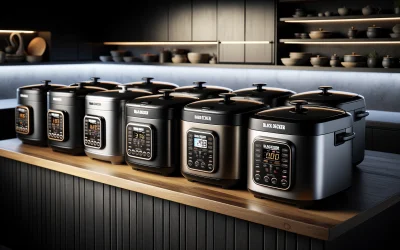As an Amazon Associate I earn from qualifying purchases.
In an era where sustainable living is not just a choice but a necessity, solar rice cookers emerge as a beacon of eco-friendly innovation in the culinary world. These cookers, harnessing the power of the sun to prepare one of the most consumed staples globally, represent a significant stride in kitchen technology. However, as consumers increasingly turn their attention to these solar-powered devices, a critical question arises: What is the cost of a solar rice cooker, and what factors into its pricing? This question is more than a matter of affordability; it delves into the value proposition of adopting solar technology in everyday cooking.
Solar rice cooker price! In this article, we embark on a comprehensive journey to unravel the pricing landscape of solar rice cookers. We will explore the myriad of factors that influence their cost, from the efficiency of solar panels and the capacity of the cookers to the quality of materials and the brand reputation. Understanding these aspects is crucial for consumers looking to make an informed decision that aligns with their budget, cooking needs, and environmental ethos. As we delve into the world of solar rice cookers, our aim is to provide clarity on what drives their prices, enabling you to assess whether a solar rice cooker is a viable addition to your kitchen arsenal. Join us as we dissect the nuances of solar rice cooker pricing, shedding light on what to expect when considering this sustainable cooking solution.
Why Choose A Solar Rice Cooker?
Choosing a solar rice cooker can offer several benefits, particularly for those who are environmentally conscious or living in areas with abundant sunshine. Here are some reasons why opting for a solar rice cooker could be a good choice:
- Eco-Friendly: Solar rice cookers use renewable energy, which reduces reliance on fossil fuels and helps lower carbon emissions. This makes them an environmentally friendly choice.
- Energy Cost Savings: By using solar power, these cookers can help save on electricity bills. They are particularly beneficial in regions with high electricity costs or where solar energy is readily available.
- Ideal for Off-Grid Living: For people living in remote areas without reliable access to electricity, solar rice cookers offer a practical solution for cooking without needing a traditional power grid.
- Emergency Preparedness: In areas prone to power outages due to natural disasters or other emergencies, a solar rice cooker can be a valuable tool for ensuring the ability to cook food without electricity.
- Portability and Convenience: Some solar rice cookers are designed to be portable, making them suitable for camping, picnics, and outdoor activities where traditional power sources are unavailable.
- Low Maintenance: Solar rice cookers typically have fewer mechanical parts compared to electric cookers, which can mean less maintenance and fewer things that can break or malfunction.
- Educational Value: Using a solar rice cooker can be a great way to educate family members, especially children, about renewable energy and sustainable living practices.
- Long-Term Investment: While the initial cost of a solar rice cooker might be higher than a traditional electric model, the long-term savings on energy bills and the benefit of a sustainable energy source can make it a cost-effective investment.
- Quiet Operation: Unlike generators or other alternative power sources, solar cookers operate silently, adding to the comfort and enjoyment of cooking.
- Healthier Cooking: Some proponents of solar cookers also argue that they can provide a healthier way of cooking, as they often cook food more slowly and gently, retaining more nutrients.
In summary, choosing a solar rice cooker aligns with both environmental consciousness and practicality, especially in sun-rich environments. It’s a choice that offers benefits beyond just cooking, extending to energy savings, sustainability, and self-reliance.
Importance of Knowing Solar Rice Cooker Price
Understanding the price of a solar rice cooker is important for several reasons, especially for consumers considering an environmentally friendly and sustainable cooking option. Here are key points highlighting the importance of knowing the cost:
- Budget Planning: Knowing the cost is essential for financial planning and budgeting. Solar rice cookers might have a different price range compared to traditional electric cookers, and being aware of these costs helps in making a feasible purchase decision.
- Cost-Benefit Analysis: Understanding the price allows for a cost-benefit analysis. Although solar rice cookers might be more expensive initially, they can offer long-term savings on electricity bills. Knowing the cost helps in evaluating whether the investment aligns with potential savings and environmental benefits.
- Technology Investment: Solar cookers often incorporate advanced technologies to efficiently convert solar energy into cooking power. Understanding the price helps in assessing the value of this technology and its efficiency.
- Quality and Durability Assessment: Higher prices can often indicate better quality materials and construction, which are crucial for the durability and longevity of solar appliances. Knowing the cost aids in gauging the quality you’re investing in.
- Comparative Shopping: Knowledge of the price range allows for effective comparison shopping. It helps in comparing different models and brands to find the best value for money based on features, efficiency, and durability.
- Return on Investment (ROI): For those looking to reduce their carbon footprint and utility bills, understanding the price helps in calculating the ROI, taking into account energy savings over time.
- Additional Costs: Being aware of the price helps in anticipating any additional costs, such as installation, maintenance, or supplementary accessories that might be needed.
- Market Understanding: Knowing the price range gives insights into the solar cooker market, including what features and innovations are available at different price points.
- Setting Expectations: Understanding pricing helps set realistic expectations about the performance and capabilities of solar rice cookers in relation to their cost.
- Long-Term Commitment: Investing in a solar cooker is often a long-term commitment to sustainable living. Knowing the cost is essential for making an informed decision about this commitment.
In conclusion, knowing the price of a solar rice cooker is crucial for making an informed purchase decision that aligns with environmental goals, budget constraints, and long-term savings expectations.
Factors Affecting Rice Cooker Prices
Several factors can affect the price of solar rice cookers, which are unique due to their reliance on solar energy. Here are the key factors that typically influence their cost:
- Solar Panel Quality and Efficiency: The type and efficiency of the solar panels used in the cooker significantly impact the price. Higher efficiency panels, which can capture more solar energy and convert it more effectively, usually increase the cost.
- Capacity and Size: The cooking capacity of the solar rice cooker affects its price. Larger cookers, which can prepare more rice at once, tend to be more expensive due to the need for larger or more efficient solar panels and bigger cooking vessels.
- Material Quality: The materials used in the construction of the cooker, especially for the cooking pot and the solar collector, play a role in pricing. Durable, high-quality materials that can withstand outdoor conditions and constant exposure to sunlight are usually costlier.
- Design and Technology: Advanced design features, such as portability, compactness, and integration of advanced technologies for temperature control or efficient heat retention, can raise the price.
- Brand and Manufacturer: Established brands with a reputation for quality and reliability in solar appliances might charge more. Additionally, the manufacturer’s location can influence costs due to production and shipping expenses.
- Energy Efficiency: Cookers with higher energy efficiency, which convert solar power to heat more effectively, can be more expensive but offer better performance and quicker cooking times.
- Additional Features: Features such as automatic temperature control, safety mechanisms, and versatility in cooking different types of food can add to the cost.
- Market Demand and Availability: The demand for solar cookers in a particular market and their availability can influence pricing. In areas where these products are less common, prices may be higher due to import and distribution costs.
- Research and Development Costs: The investment in research and development for innovative solar cooking technologies can be factored into the final price of the product.
- Environmental and Sustainability Certifications: Solar rice cookers that come with environmental or sustainability certifications, ensuring they meet certain eco-friendly standards, might have a higher price tag.
Understanding these factors can help consumers make more informed decisions when considering the purchase of a solar rice cooker, balancing the initial investment against long-term benefits like energy savings and environmental impact.
How Much Do Solar Rice Cookers Price?
The price range of solar rice cookers can vary significantly based on their features, quality, and the factors previously mentioned. Here’s a general overview of what you might expect across different tiers of solar rice cookers:
Basic Models
- Price Range: Generally, basic solar rice cookers can start from around $50 to $150.
- Features: These models typically have simpler designs and may use less efficient solar panels. They usually have basic functionality with limited capacity, suitable for small servings.
- Suitability: Ideal for individuals or small families, or for those who want to try solar cooking without a significant investment.
Mid-Range Models
- Price Range: Mid-range solar rice cookers can be priced between $150 and $300.
- Features: These cookers might offer better efficiency with higher quality solar panels. They often come with improved build quality and may include features like better temperature control, medium cooking capacity, and enhanced portability.
- Suitability: Suitable for regular use in medium-sized households or for those who are looking for a balance between functionality and price.
High-End Models
- Price Range: High-end models can range from $300 to $600 or more.
- Features: These premium cookers are equipped with the most efficient solar panels and may offer advanced features like larger capacity, high durability, enhanced temperature regulation, and versatile cooking options. They might also include smart features or be made from premium materials.
- Suitability: Best suited for large families or commercial use, as well as for those who are committed to sustainable living and want the best performance and durability.
It’s important to note that prices can vary based on the brand, the specific technology used, the region, and the availability of the product. Additionally, the market for solar rice cookers is less standardized than conventional electric cookers, so there might be more variation in prices and features. Always consider your specific needs, usage frequency, and the particular environment in which you’ll be using the solar cooker when making a decision.
Maintenance and Longevity in Relation to Price
The relationship between the price of a solar rice cooker, its maintenance requirements, and its longevity is an important consideration for potential buyers. Here’s how these aspects typically relate:
Maintenance
- Lower-Priced Models: Basic solar rice cookers might require more frequent maintenance due to less durable materials or simpler construction. Components like solar panels or cooking surfaces might be more susceptible to wear and tear, leading to a need for more regular upkeep or part replacements.
- Mid-Range Models: These cookers usually offer a balance between durability and cost. They may require moderate maintenance, with better quality components that withstand regular use more effectively than the basic models.
- High-End Models: Premium solar rice cookers are often designed with durability in mind, using high-quality materials and construction. They typically require less maintenance due to better resistance to environmental factors and wear. The higher price often reflects this reduced need for upkeep and potential long-term savings in maintenance costs.
Longevity
- Lower-Priced Models: The longevity of basic models may be shorter due to less robust construction and materials. They might be more prone to issues like degradation of solar panels or damage to cooking elements.
- Mid-Range Models: Offering a compromise between cost and quality, these cookers generally provide a decent lifespan, assuming regular maintenance and proper usage.
- High-End Models: With the highest quality materials and construction, along with advanced technologies, high-end solar rice cookers are typically designed to last longer. The initial higher investment often translates into greater longevity, making them more cost-effective over time.
Considerations
- Usage Frequency and Care: Regardless of the price, the longevity and maintenance needs of a solar rice cooker also depend on how frequently it’s used and how well it’s cared for. Regular cleaning, proper storage, and careful handling are crucial for all models.
- Environmental Factors: Exposure to harsh weather conditions can impact the maintenance and longevity of a solar cooker. High-end models might be more resilient to such factors.
- Warranty and Support: A longer warranty period, often available with more expensive models, can provide peace of mind and protection against defects or early wear.
- Replacement Parts: The availability and cost of replacement parts should also be considered. Higher-end models might have more expensive parts, but they might also be less frequently needed.
In summary, while higher-priced solar rice cookers generally offer better durability and lower maintenance needs, contributing to longer lifespans, the best choice for an individual will depend on their specific usage requirements, budget, and willingness to maintain the appliance. Balancing these factors will help in making a cost-effective decision.
Price Comparison Table
A comprehensive price comparison table for different models of solar rice cookers can be challenging due to the variability in the market and the specificity of models available.
| Model Type | Price Range | Capacity | Key Features | Ideal For |
| Basic Models | $50 – $150 | Small (1-3 cups) | Basic solar panel, simple design, manual controls | Individuals or small families, occasional use |
| Mid-Range Models | $150 – $300 | Medium (4-6 cups) | Higher efficiency solar panels, improved durability, some automatic features | Regular use in medium-sized households |
| High-End Models | $300 – $600+ | Large (7+ cups) | High-efficiency panels, advanced temperature control, durable materials, versatile cooking options | Large families, frequent users, commercial use |
Please note that this table is illustrative and the actual market offerings can vary. Specific models may have additional features or different price points. The capacity is indicated in terms of how many cups of rice the cooker can handle, which is a standard measure for rice cookers.
When comparing models, it’s also important to consider factors such as brand reputation, warranty terms, and customer reviews. This table serves as a starting point for understanding the general landscape of solar rice cooker pricing and features.
Cost-Effective Buying Tips for Solar Rice Cookers
When considering the purchase of a solar rice cooker, it’s important to make a cost-effective decision that balances price with quality, efficiency, and your specific needs. Here are some buying tips to help you make a wise investment:
- Assess Your Needs: Consider how often you’ll use the solar cooker and for how many people you typically cook. Choose a size and model that fits your regular usage to avoid overspending on an oversized or overly sophisticated model.
- Research and Compare: Take time to research different models and brands. Compare their features, prices, and reviews. Pay attention to customer feedback, especially regarding durability and reliability.
- Efficiency Matters: Look for a cooker with high solar panel efficiency. Efficient models convert solar energy to heat more effectively, which means faster cooking times and better performance.
- Material Quality: Check the quality of materials used, especially for the solar panels and cooking pot. Durable materials might be more expensive initially but can offer better longevity and performance.
- Portability and Convenience: If you plan to use the cooker outdoors or in different locations, consider its portability. Lightweight and easily transportable models might offer more convenience.
- Warranty and After-Sales Service: A good warranty can save you money on potential repairs. Also, consider the manufacturer’s customer service reputation for support and availability of replacement parts.
- Energy Savings vs. Initial Cost: Calculate potential energy savings against the initial cost. A more expensive model might be more energy-efficient, leading to savings on electricity bills in the long run.
- Environmental Impact: If environmental sustainability is important to you, consider the environmental footprint of the cooker, including the materials used and the manufacturing process.
- Avoid Overbuying: Don’t pay for extra features you don’t need. Focus on what’s essential for your cooking habits and preferences.
- Sales and Discounts: Look out for sales, discounts, or rebates, especially during holiday seasons or special promotional events.
- Brand Reputation: Sometimes, paying slightly more for a reputable brand can be more cost-effective due to better quality and longevity.
- Long-Term Investment: Consider the solar rice cooker as a long-term investment. An initially more expensive model that lasts longer and performs better can be more cost-effective over time.
By carefully considering these factors, you can choose a solar rice cooker that not only meets your culinary needs but also offers good value for money, energy efficiency, and aligns with your environmental values.
Frequently Asked Questions (FAQ’s)
Q: What factors contribute to the wide price range in solar rice cookers?
A: The price of solar rice cookers varies based on factors like solar panel efficiency and type, cooker capacity, material quality, additional technological features, brand reputation, and the design’s overall efficiency. High-efficiency solar panels and advanced features like temperature control tend to increase the price.
Q: Is it more cost-effective to invest in a high-end solar rice cooker?
A: In the long term, investing in a high-end model can be more cost-effective. These cookers usually have higher efficiency, better durability, and more advanced features, leading to better cooking performance and longevity, which can offset the initial higher cost.
Q: Can the capacity of a solar rice cooker affect its price?
A: Yes, capacity affects the price. Larger cookers, which can cook more rice at once, require larger or more efficient solar panels and robust construction, all of which increase the cost.
Q: Are there additional costs associated with solar rice cookers apart from the purchase price?
A: Additional costs can include maintenance, especially for the solar panels, and potentially the need for accessories or replacement parts. However, these costs are usually minimal compared to electric cookers, as solar cookers have fewer mechanical parts.
Q: How does the efficiency of the solar panel in a rice cooker influence its price?
A: The efficiency of the solar panel is a significant factor in pricing. Higher efficiency panels are more expensive but offer better performance and faster cooking times, making the cooker more reliable and effective.
Q: What should buyers look for in a solar rice cooker to ensure they are getting a good value for the price?
A: Buyers should look for a balance between efficient solar energy conversion, cooking capacity, durability, and ease of use. Reading customer reviews and considering the reputation of the brand can also provide insights into the value for the price.
Conclusion
As we conclude our exploration into the pricing of solar rice cookers, it becomes evident that the decision to invest in one of these eco-friendly appliances is influenced by a complex interplay of factors. The cost of solar rice cookers, we’ve learned, is not just a reflection of their capability to cook rice using solar energy, but also of the technology, materials, and design efforts that go into making them efficient, durable, and user-friendly.
The diversity in prices, ranging from basic to high-end models, signifies that there is a solar rice cooker for almost every budget and need. For those committed to reducing their carbon footprint, the higher initial investment in a solar cooker can be seen as a contribution towards a more sustainable future, while also promising potential savings in electricity bills in the long run. On the other hand, even the more modestly priced models offer a gateway into the world of solar cooking, making this technology accessible to a broader audience.
This journey through the price dynamics of solar rice cookers underscores a critical point: the value of these devices extends beyond their price tags. By adopting solar cooking, users not only embrace a more environmentally friendly way of preparing meals but also join a growing movement towards sustainable living. The cost of a solar rice cooker, therefore, embodies both a financial investment and an investment in a greener planet.
In summary, understanding the pricing of solar rice cookers equips consumers with the knowledge to make informed decisions that align with their environmental values, cooking needs, and financial considerations. As the world continues to gravitate towards renewable energy sources, solar rice cookers stand out as a practical and symbolic choice for those looking to make a difference, one meal at a time.






